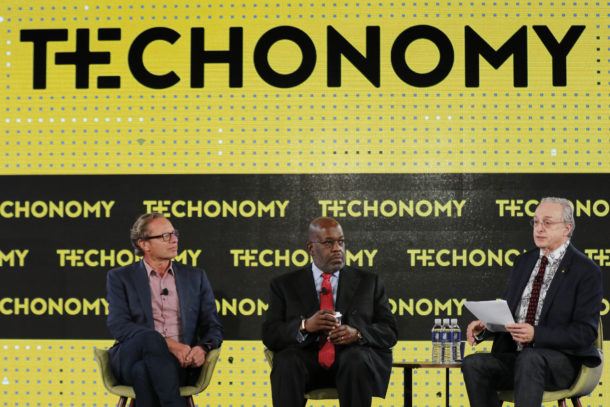
With all the uncertainty around the Affordable Care Act, the Techonomy 2016 audience listened attentively to two experts in the field for clues about how healthcare and health insurance would change in the coming years. Techonomy’s David Kirkpatrick interviewed Bernard Tyson, chairman and CEO of Kaiser Permanente, and Jeroen Tas, CEO of Philips Connected Care & Health Informatics. Among other predictions, the speakers said digital health will unquestionably play a major role in healthcare moving forward, that the ACA will be harder to repeal than many might expect, and that reimbursement strategies are likely to shift to a more outcomes-based model.
At Kaiser, where insurance and healthcare are integrated into a single system covering some 11 million people, Tyson said that digital health and other means of virtual care have been a major focus. It’s resonating with the patient community: Tyson reported that 52% of the organization’s 100 million primary care visits last year occurred remotely, such as by phone or video chat. Kaiser refers to this as the “Care Anywhere” approach, and said it has obvious advantages for patients seeking to minimize time away from home or work to get medical guidance.
Both speakers discussed the need to understand and when possible influence other factors related to health, such as behavior, socioeconomic status, and environment. Chronic disease, for example, is responsible for 86% of healthcare costs and is strongly linked to non-medical factors, Tas said. Health outcomes are dependent on things like whether people take their medications as directed — something that only half of patients do, he added. This represents a major opportunity to effect change through better engagement, he said. Tyson said that 40% of a person’s health status is driven by behavior, such as what he eats or drinks or whether he smokes. Just 10% of a person’s health status is based on his response to actual healthcare, he added, suggesting that it’s time to move the focus beyond doctors’ visits and toward areas that have a bigger impact. A tax on cigarettes or sugary drinks is one example of such an approach.
The idea of looking more holistically at health factors ties nicely into the themes of measuring outcomes and shifting reimbursement away from fee-based models in favor of outcome-based ones. Tas noted that there is evidence showing that healthcare programs can significantly reduce the need for emergency care, for instance, “but only if you reimburse on outcomes.” This puts the focus on prevention and early detection, where changes have the greatest impact on health.
As for the ACA, Tyson predicted that campaign commitments to repeal the law aren’t likely to come to fruition—at least not anytime soon. “I don’t believe that once the new administration gets under the hood of the ACA that we’re going to end with the same narrative that we’ve been hearing,” he said. “I don’t believe that this new administration is going to uninsure 20 million in the first 100 days.” He expressed hope that “reasonable minds” would come together to find better solutions, and said that change might be driven by large employers, since companies insure the majority of Americans and are actively seeking ways to improve the system. He noted that large employers are already organizing to push toward outcome-based care and other changes. Maintaining the status quo—not just for Obamacare but for the field in general—will not be an option, Tyson said: “I don’t have any doubt in my mind that the industry will be forced to change. … The evidence is becoming clearer and clearer that we have a real opportunity to transform the healthcare delivery system in this country.”
For more coverage of the Techonomy conference, click here. Watch the interview with Jeroen Tas and Bernard J. Tyson in its entirety, here.
Kaiser and Philips Health Chiefs on Obamacare and U.S. Medicine’s Future at Techonomy
With all the uncertainty around the Affordable Care Act, the Techonomy 2016 audience listened attentively to two experts in the field. Among other predictions, the speakers said digital health will unquestionably play a major role in healthcare moving forward, that the ACA will be harder to repeal than many might expect, and that reimbursement strategies are likely to shift to a more outcomes-based model.
















